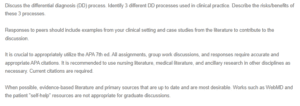Discussion – Differential Diagnosis
The differential diagnosis (DD) procedure holds significant importance within clinical practice as it is crucial to discerning the fundamental etiologies responsible for a patient’s presenting symptoms (Cook & Décary, 2020). Three frequently utilized processes in diagnostic decision-making encompass pattern recognition, diagnostic algorithms, and clinical reasoning. Firstly, the pattern recognition process hinges upon the discerning acumen and erudition of a clinician, who adeptly identifies recurring symptom patterns indicative of particular maladies. The utilization of this method presents the notable benefit of expeditiousness. Yet, it also entails the peril of plausible fallacies arising from cognitive biases, as it may inadvertently neglect infrequent or atypical manifestations (Fong, 2019).
Second, diagnostic algorithms serve as systematic decision-making instruments that effectively steer clinicians through a meticulously structured course of action grounded in evidence-based guidelines. They augment the dependability of diagnostic outcomes and compliance with established protocols, albeit potentially exhibiting reduced flexibility when faced with atypical patient circumstances (Fong, 2019). Third, clinical reasoning encompasses the cognitive faculties of critical analysis and the application of problem-solving methodologies, necessitating healthcare professionals to diligently amass pertinent patient information, formulate educated conjectures, and execute comprehensive evaluations. This particular methodology offers a more all-encompassing assessment, albeit one that may require a significant investment of time and heavily relies on the cognitive capacities of the clinician in question (Fong, 2019).
Every individual process possesses its own set of advantages and disadvantages. Using pattern recognition methodologies presents a notable advantage in terms of efficiency; however, it is essential to acknowledge its inherent vulnerability to biases. On the other hand, diagnostic algorithms offer a commendable level of reliability, yet they may fall short of adequately accommodating atypical or uncommon cases. The process of clinical reasoning affords a holistic and all-encompassing methodology, though with the potential drawback of potential diagnostic procrastination, contingent upon the proficiency and understanding of the clinician.
In practical application, employing a harmonious amalgamation of these methodologies is customary to enhance diagnostic precision while concurrently upholding operational efficiency. The perpetual dependence on evidence-based guidelines and the continuous pursuit of education is imperative to enhance the diagnostic decision-making process and elevate the quality of patient care.
References
Cook, C. E., & Décary, S. (2020). Higher-order thinking about differential diagnosis. Brazilian Journal of Physical Therapy, 24(1), 1–7. https://doi.org/10.1016/j.bjpt.2019.01.010
Fong, N. (2019). Learning how to diagnose. World Scientific EBooks, 3–15. https://doi.org/10.1142/9789813232938_0001
ORDER A PLAGIARISM-FREE PAPER HERE
We’ll write everything from scratch
Question

Discussion – Differential Diagnosis
Discuss the differential diagnosis (DD) process. Identify 3 different DD processes used in clinical practice. Describe the risks/benefits of these 3 processes.
Responses to peers should include examples from your clinical setting and case studies from the literature to contribute to the discussion.
It is crucial to appropriately utilize the APA 7th ed. All assignments, group work discussions, and responses require accurate and appropriate APA citations. It is recommended to use nursing literature, medical literature, and ancillary research in other disciplines as necessary. Current citations are required.
When possible, evidence-based literature and primary sources that are up to date and are most desirable. Works such as WebMD and the patient “self-help” resources are not appropriate for graduate discussions.

